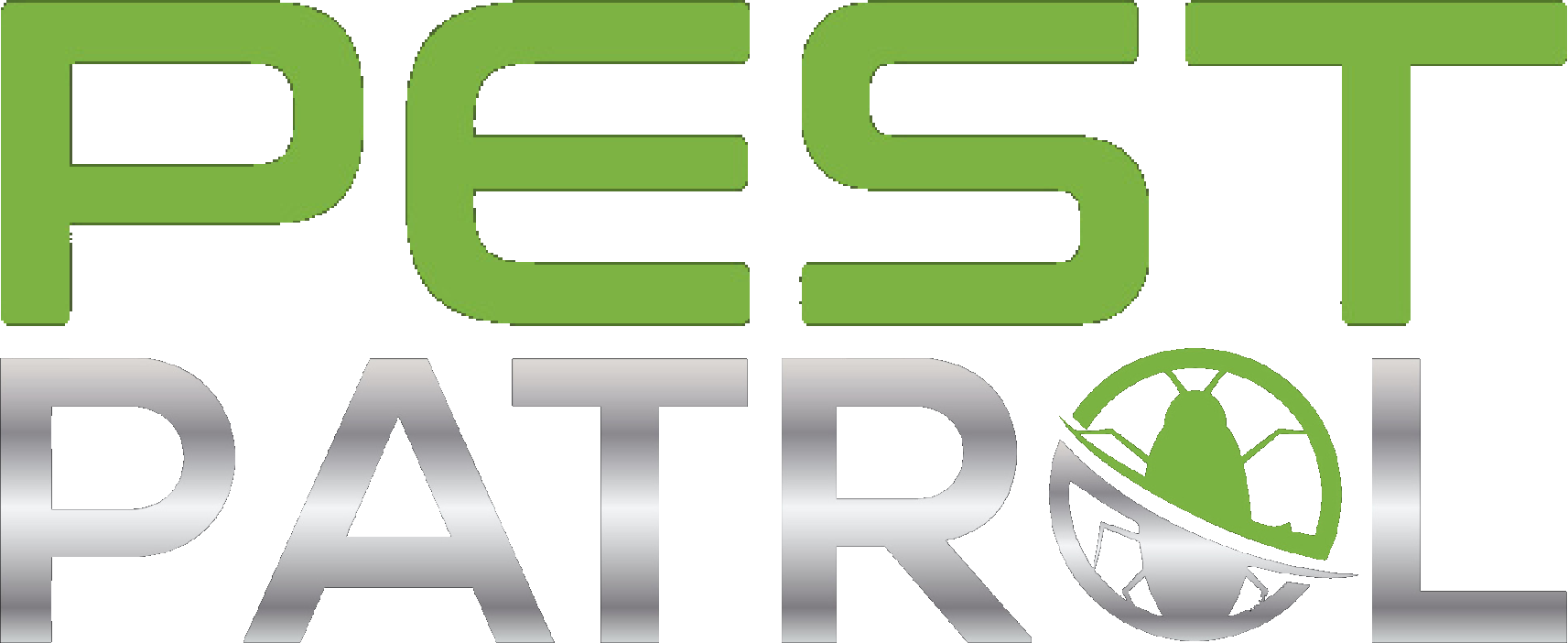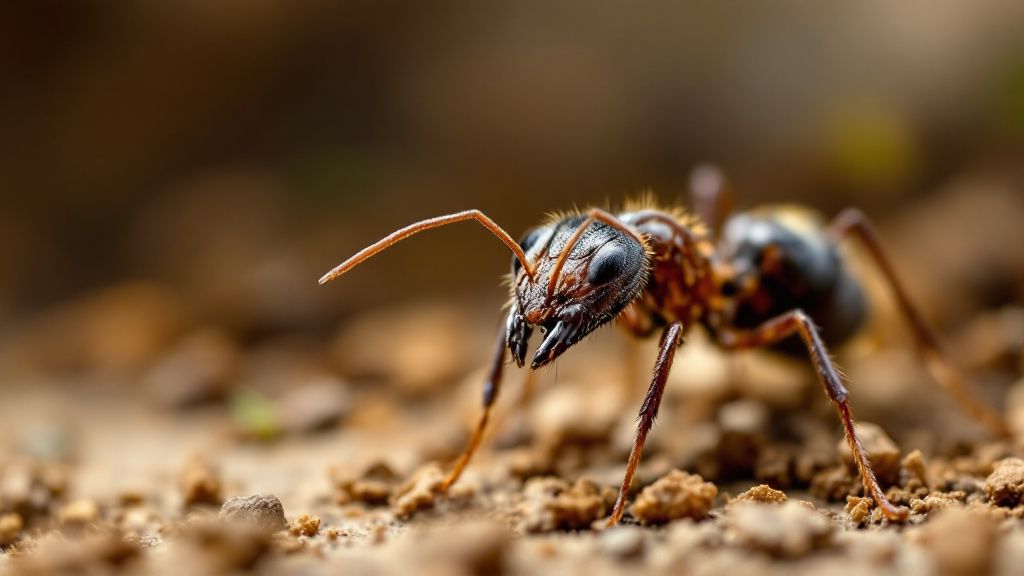Your home is your sanctuary, yet ant invasions can disrupt the peace. Unlock the secrets of expert tactics to effectively control these persistent pests. Begin by fortifying your household pest defense through smart ant control methods designed to fit your needs. Implement ant prevention tips that include both organic solutions and non-toxic ant repellents, allowing for safe control around children and pets. Utilize eco-friendly pest control techniques, such as homemade ant remedies and natural ant repellents, which provide sustainable solutions for long-term pest prevention. Ant proofing homes with strategic ant barrier techniques can be part of an effective pest management strategy. For more stubborn issues, professional ant treatment services can offer comprehensive indoor ant solutions and pest prevention advice tailored to nip the problem in the bud. Maintain a vigilant pest management routine that integrates these tactics with ant bait stations and traps to disrupt their habitat and diminish infestations. By adopting these strategies, you can regain control of your home environment and deter ant problems before they escalate.

Understanding Common Ant Species in Your Home
Many residents might be surprised to find that ants are not just a warm-weather nuisance; they’re a year-round concern in many areas. Identifying the species invading your home forms the crux of effective ant control. Common species include the odorous house ant, carpenter ant, and pavement ant, each requiring tailored pest management strategies. Recognizing the specific type helps in employing the right ant-proofing methods for your home’s defense.
Among the ants that infest homes, odorous house ants are notorious for their attraction to sweets and strong, rotten coconut-like odor when crushed. For these ants, natural ant repellents and homemade ant remedies offer practical DIY ant control options. On the other hand, carpenter ants are more destructive, burrowing through wood to create nests. Ant traps and bait stations are essential in targeting these pests for home ant extermination, focusing on ant nest elimination.
Pavement ants, recognizable by the small mounds of soil they leave on driveways and patios, often find their way indoors. Controlling these ants typically involves indoor ant solutions centered around ant barrier techniques. Professional ant treatment may be necessary if an infestation escalates, providing safe ant control options that align with child-safe pest control standards, allowing for peace of mind.
One unpopular opinion regarding controlling ant species is that some homeowners believe in co-existing rather than exterminating them entirely. However, this could pose significant risks to your home’s structural integrity and health standards. Employing eco-friendly pest control through organic ant solutions offers a balanced approach to both protect your home and reduce environmental impact.
Integrative pest management, which combines pest prevention advice with smart ant control methods, presents a sustainable pest management solution. By understanding the behavior and preferences of different ant species, you can optimally implement pest control services and household pest defense tactics that are both effective and respectful of your living environment.
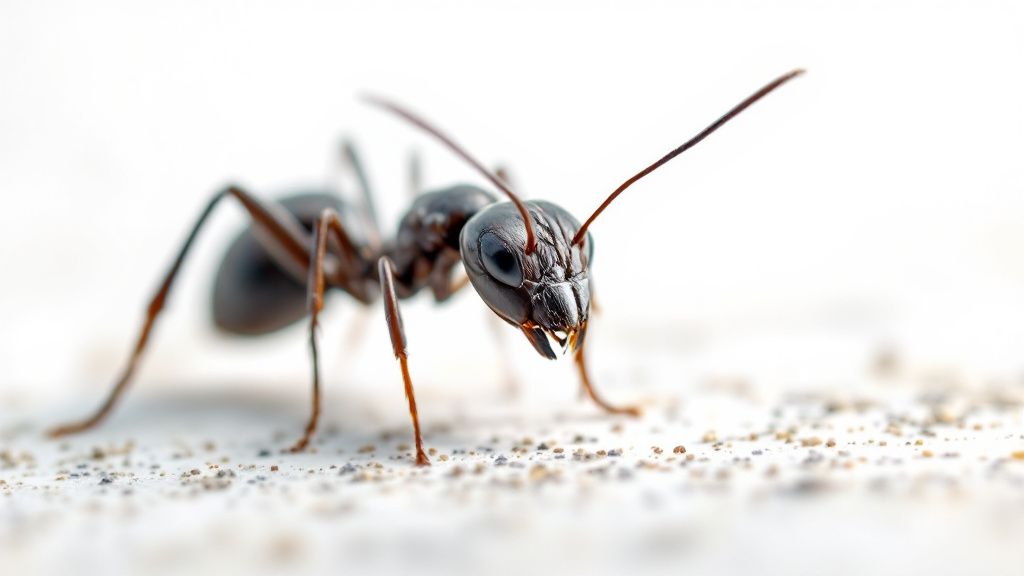
The Science Behind Ant Behavior
Understanding ant behavior is key to formulating effective pest management strategies. Ants communicate and coordinate within their colony through pheromones, chemical signals that guide them to food sources and alert them to danger. These behaviors can complicate Residential pest control as ants can bypass traditional barriers, making Ant barrier techniques and non-toxic ant repellents integral parts of your strategy.
Ants are incredibly organized and resilient, with colonies often having specific tasks for each group member, including foragers, workers, and soldiers. This division of labor makes smart ant control methods crucial for targeting the right sections of the colony. According to recent studies, pheromone trails play a significant role in ant infestation prevention, explaining how ants efficiently navigate large homes, necessitating swift and decisive action.
Ants have a natural instinct to build their colonies in and around human habitats, exploiting every available resource for food and shelter. Understanding the nesting behavior can inform safe ant control and ant nest elimination techniques. By analyzing these behavioral patterns, integrative pest management can provide tailored ant prevention tips and ant problem solutions that align with long-term pest prevention goals.
The science behind ant foraging often leads them indoors, prompting the need for Indoor ant solutions such as ant bait stations and ant traps. By understanding foraging habits, you can utilize DIY ant control measures that focus on strategic placement and timing. Addressing these behavioral elements with sophisticated pest control services can ensure your household remains a sanctuary free from ant disruptions.

Effective Natural Remedies for Ant Control
Utilizing natural remedies for ant control in your home not only supports eco-friendly living but also ensures safe ant control without harsh chemicals. Ingredients like vinegar, cinnamon, and peppermint oil are popular for their efficacy in disrupting ant trails and acting as non-toxic ant repellents. These organic ant solutions offer cost-effective methods to deter ants and secure the household against infestations while supporting your long-term pest prevention strategy.
Homemade ant remedies can advance your pest management strategies by incorporating everyday items. Vinegar works wonders in masking scent trails, while cinnamon and peppermint act as formidable barriers that ants often avoid. In the words of Rachel Carson, "The control of nature is a phrase conceived in arrogance," emphasizing the value of integrated and respectful pest management approaches that align with sustainable pest management ideals.
Employing these natural ant repellents contributes to child-safe pest control and maintains an harmonious living environment. By embracing smart ant control methods that prioritize household pest defense, you adopt pest prevention advice that precludes the need for synthetic interventions. Integrative pest management, bolstered by these remedies, provides a balanced framework for Residential pest control, ensuring that your sanctuary remains undisturbed by unwanted guests.
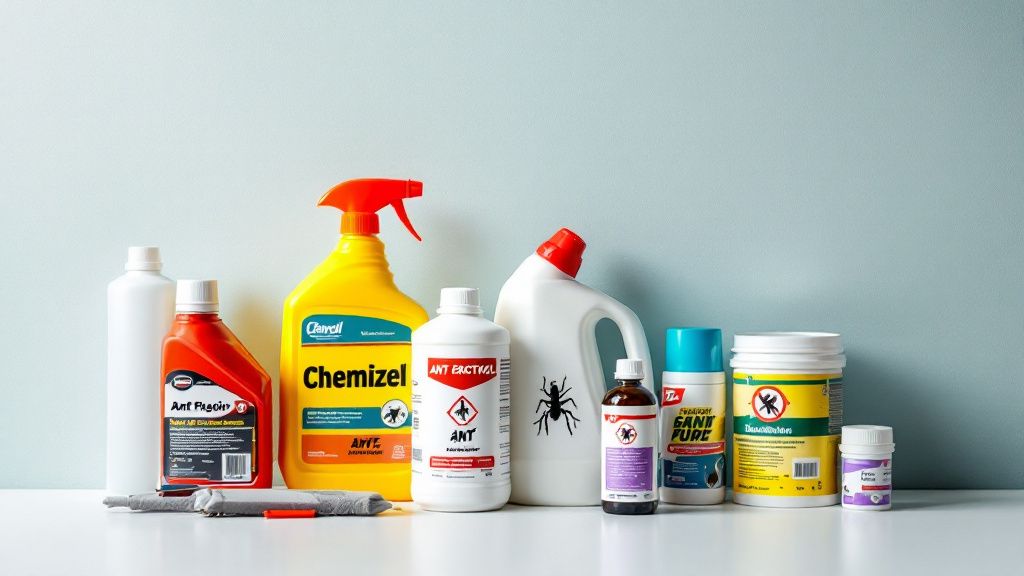
Chemical Solutions: Safely Using Pesticides
In the realm of pest management, the use of chemical solutions has long been a tool in effectively managing ant infestations in residential areas. Tracing its evolution from the early 20th century, pesticide development has become more sophisticated, focusing on minimizing harm to humans and the environment. Today, safe ant control involves choosing products specifically designed for home use, favoring those that integrate with eco-friendly pest control principles while targeting only the ants.
Understanding pesticide labels and following directions ensures effective ant control without compromising household safety. Products like ant bait stations offer a controlled release of insecticide, directly impacting the colony while reducing exposure risks associated with sprays. This approach complements child-safe pest control and enhances home ant extermination efforts. Integrative pest management advocates for combining chemical solutions with natural ant repellents for a balanced and sustainable strategy in ant-proofing homes.
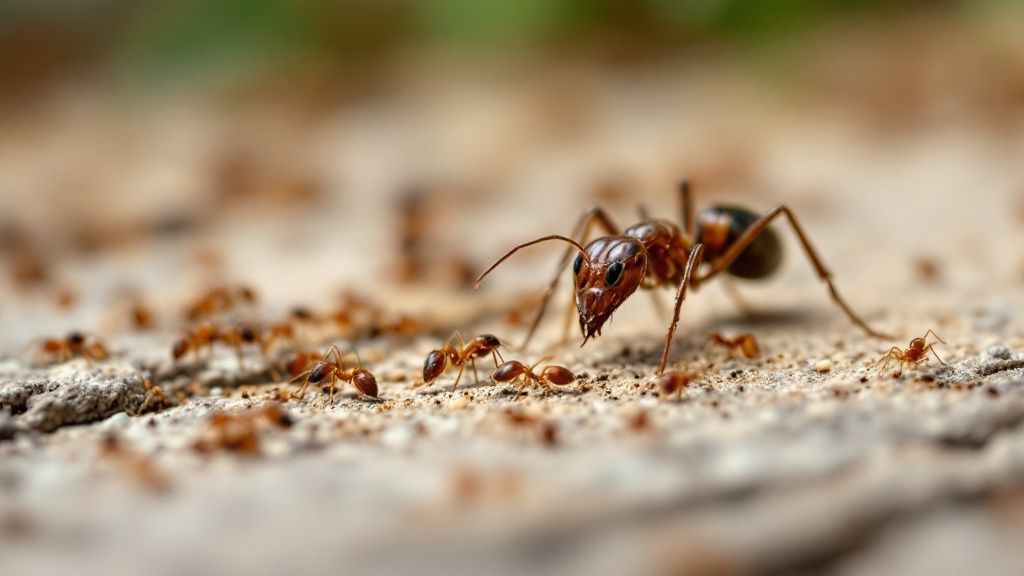
Preventative Measures to Keep Ants at Bay
Securing your home against ant invasions requires foresight and effective pest prevention strategies. Start by sealing entry points such as cracks and crevices using caulk and weather stripping. Regularly clean kitchens and dining areas to eliminate food sources that attract ants. Consider utilizing natural ant repellents like citrus peels and essential oils as part of your non-toxic ant repellent arsenal to maintain a household pest defense.
A closer look at the experiences of homeowners with Ant proofing homes reveals that consistent maintenance can significantly reduce incidents of ant infestations. For example, routine inspections of food storage areas and immediate clean-up of spills can prevent ants from establishing their trails. This practical approach aligns with eco-friendly pest control methods, ensuring that your efforts contribute to long-term pest prevention.
Outside, maintain a perimeter of ant barriers by trimming vegetation and eliminating standing water around the home. Employing DIY ant control measures such as coffee grounds or diatomaceous earth can deter ants without harmful chemicals. These integrative pest management techniques provide smart, sustainable pest management solutions, reinforcing Residential pest control measures that keep your home as a sanctuary from unwelcome ant guests.
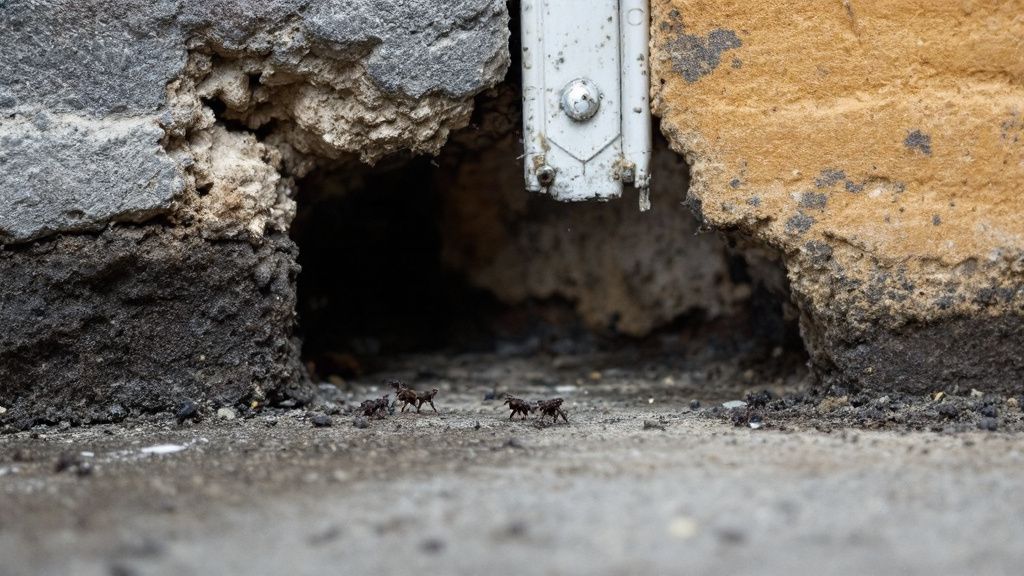
Sealing Entry Points: Protect Your Home
Protecting your home from ants begins with identifying and sealing entry points. Cracks in walls, gaps around windows, and spaces under doors provide easy access for ants. Applying caulk or weatherstripping to these areas forms an effective ant barrier. In the realm of Residential pest control, attention to detail can make a significant impact in achieving Ant infestation prevention and shield your home from pest invasions.
Common sources of entry should not be overlooked. Air vents, utility lines, and basements often serve as unnoticed gateways for ants. Consider using draft excluders or mesh screens to block these access points. These ant-proofing techniques, part of smart ant control methods, support Sustainable pest management and contribute to a robust Household pest defense, preventing ants from establishing a presence.
In the next few years, advancements in building materials and sealing technology are likely to revolutionize how we manage ant-proofing homes. With predictably tougher barriers, homes may inherently deter ant entry without relying heavily on external pest control interventions. This shift will drive further integration of eco-friendly pest control practices within Residential pest control frameworks, emphasizing the importance of prevention over reaction.
Sealing techniques are most effective when complemented by routine inspections and maintenance. Regular checks ensure that sealants remain intact and that no new entry points have developed. Combining these strategies with other pest management approaches, such as Ant bait stations or non-toxic repellents, can provide a comprehensive defense against ants and offer peace of mind for homeowners.
